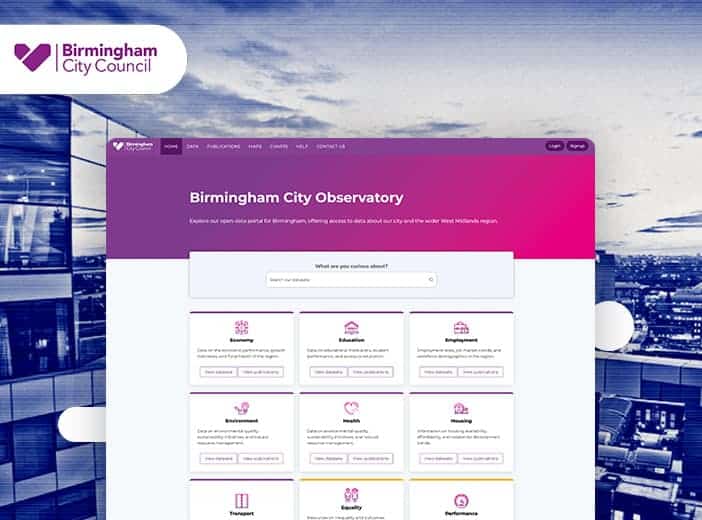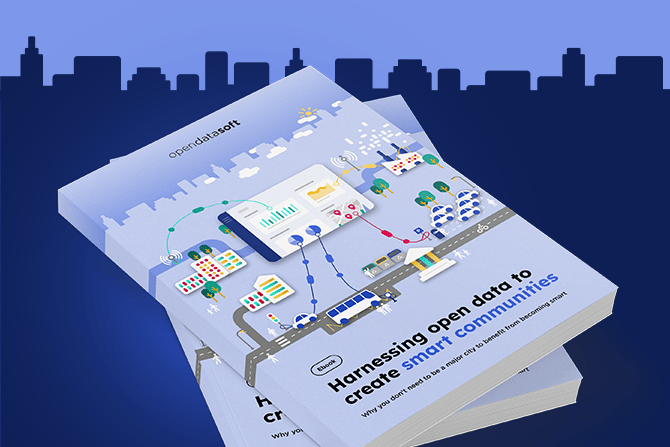How can you meet regulatory requirements with a public data marketplace?

Public bodies have a regulatory need to share key data on their performance and activities with citizens and other stakeholders. Public data marketplaces enable organizations to deliver seamless access to data for all while maximizing efficiency and reducing risk.
Across the globe, freedom of information regulations mandate that public bodies, from municipalities to state and central government departments open their data so that it can be easily accessed by citizens, businesses, start-ups, researchers and other stakeholders. However, often public bodies need to share a wide range of information, from across the organization, adding to time and cost pressures.
Simply publishing this information on corporate websites or via static PDFs is inefficient and does not engage stakeholders or drive transparency. Instead, sharing data through a Opendatasoft public data marketplace delivers seven key benefits to public organizations:
Seamless self-service access
Citizens are not likely to be data specialists – or know specific public sector terminology. Built on the same intuitive experience as an ecommerce marketplace, our technology enables everyone to easily discover, access and interact with data, without requiring technical skills. AI-driven semantic search connects users to the right data, while powerful visualizations bring information to life through dashboards, data stories, maps and graphs. Users can create their own visualizations, either by selecting data themselves or by asking natural language questions through our AI interface. Recommendations and reviews highlight other relevant data and users can interact directly with data owners through data pages.This maximizes data usage, delivers transparency and engages stakeholders.
Reduced administration time
The Opendatasoft solution can be managed by small teams – or even single individuals – and doesn’t require specialist skills. 80+ connectors enable the integration of data from business systems, cloud storage platforms, Internet of Things sensors and applications in the data stack, minimizing preparation time, with in-built metadata management to reinforce governance and compliance. Easy to administer, the solution contains a range of tools to automate data management and publication, including our No Code Studio which enables teams to create engaging visualizations without writing a line of code.
Full, inclusive support and training
Some public data sharing solutions require any changes to the data marketplace to be made by the supplier, often at extra cost. Opendatasoft provides full support alongside its solution, with the aim of training customers so that they have the internal skills and capabilities to manage their public data marketplace. Support includes access to Customer Success Managers, comprehensive documentation, training resources, the ability to purchase additional services, and our Community, which enables customers to ask and answer questions and share best practice.
Greater efficiency
Manually answering user requests for data, whether an update on a planning application or a freedom of information question takes time and resources. By making the right data available in a range of formats, organizations boost efficiency and save money. Through the Opendatasoft platform data can be accessed through visualizations, as raw data, downloaded in common file formats, or connected via built-in APIs. All of this reduces the cost of managing and sharing data, enabling your team to focus on adding value and maximizing the ROI from your complete data stack.
Fast deployment
In most countries regulations mandating public data sharing are already in place, making implementing solutions to successfully share data a priority – they need to be live as soon as is feasible. The combination of Opendatasoft’s flexibility, scalable SaaS-based deployment and ease of administration mean that a new marketplace can be live in days or weeks, with data assets migrated from any existing solutions, or simply shared virtually. Teams can quickly show the value of data sharing to senior management, external users, and internal data owners, driving engagement and usage, unlocking further budget, and encouraging the sharing of more data over time.
Ability to enrich and standardize data
Raw data is often difficult for users to understand or benefit from. The Opendatasoft solution features a range of processors to automate data enrichment and standardization, making information more usable at scale. For example, data can be enriched with geographic information, centralized master data or available classification information, such as administrative boundaries. The Opendatasoft Data hub extends this, sharing over 35,000 data assets from publishers around the world. Processors automatically standardize data formats, such as around dates, to ensure accuracy and minimize manual work, while enforcing metadata and governance standards.
Powerful monitoring and reporting
Demonstrating compliance and protecting data are key requirements for public sector data sharing. Built-in data governance, granular access management and the highest levels of security ensure confidentiality and anonymity of sensitive data while enabling seamless sharing. Data lineage functionality allows you to understand your data’s journey, through end-to-end tracking that highlights where data assets are being used and dependencies between them.
Find out more about how Opendatasoft can support public data sharing by contacting our experts.

The largest local authority in the United Kingdom, Birmingham City Council serves a population of over one million citizens. Due to its size and range of activities it collects, generates, and uses an enormous amount of data. It recognized that sharing this effectively with its community would deliver enormous benefits. Its self-service data marketplace therefore features comprehensive information organized into nine themes, with every dataset provided with its own insights page to explain and give context to the data it contains. This enables users, including staff, citizens, voluntary organizations and healthcare bodies to easily understand information, ensuring accountability, boosting collaboration, and driving improvements. Find out more in the success story.

How can you create a cost-effective, data-driven smart city? Download our new ebook and learn how harnessing open data can help municipalities create smarter communities: what is a smart city, how does it benefit municipalities and what holds back success? how can you cost-effectively build a smart city? best practice recommendations from industry experts: discover the 10 steps to becoming a smart city using open data examples of use case successes from our customers: Morrisville, Cary, Kingston, Jersey City, Southern Grampians, Western Parkland and Bristol.

State governments cover an enormous range of services and are often complex, diverse organizations. Data sharing helps them become more collaborative, efficient and effective, building trust with stakeholders. How can data exchanges break down silos and enable data sharing and help them meet their key objectives?
